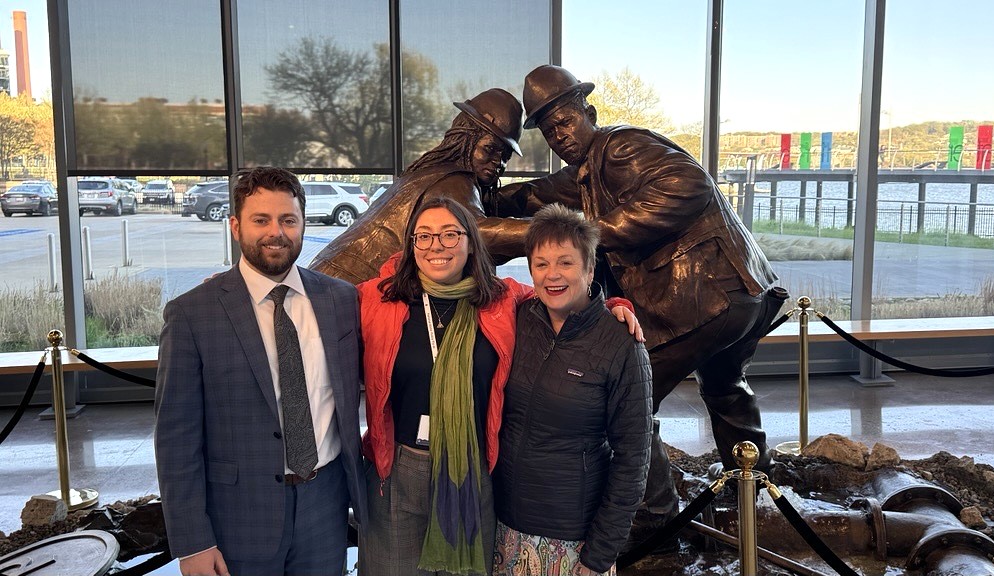
Every April, water professionals convene in Washington D.C. for the National Water Policy Fly-In, a two-day conference focused on ongoing challenges and policy changes in the water sector. Throughout the event, participants have the opportunity to hear from industry leaders, network with colleagues and engage directly with representatives from Congress.
This year, NEIWPCC sent a small delegation, consisting of Executive Director Susan Sullivan and Environmental Analysts Ryan Buckley and Daphne Short, to attend the event. Buckley attended as a recipient of the Water Environment Federation’s Young Professionals Scholarship, a prestigious award given to 26 individuals with fewer than five years of professional experience.
“Receiving this scholarship was an opportunity for me to experience the political process and how it relates to the water industry,” said Buckley, who coordinates NEIWPCC’s wastewater training programs.
NEIWPCC’s Rhode Island commissioner Janine Burke-Wells, who serves as the executive director of the North East Biosolids and Residuals Association (NEBRA), also attended the event.
The fly-in is the centerpiece of Water Week, which is organized annually to allow time and space for professionals to engage directly with key federal officials and advocate for clean and safe water. The events are organized by a coalition of national water associations, including the Water Environment Federation (WEF), National Association of Clean Water Agencies and others dedicated to advancing sustainable infrastructure and water policy at the federal level. This year, more than 700 professionals from around the country gathered at the fly-in to help advance four key water policy priorities:
- Providing affordable water services in the face of aging infrastructure, rising operational costs, supply chain disruptions and labor shortages.
- Navigating a rapidly evolving regulatory environment on issues ranging from emerging contaminants like per- and polyfluoroalkyl substances (PFAS) to nutrient management.
- Ensuring resilience to threats such as drought, flooding and cyberattacks.
- Advancing water research to develop innovative cost-effective solutions to meet critical water challenges.
Mickey Conway, chief executive officer for Metro Water Recovery in Denver, and David L. Gadis, chief executive officer and general manager of the District of Columbia Water and Sewer Authority (DC Water), spoke to participants about the importance of the sector speaking as one unified voice when advocating for water policy changes.
Representatives from the U.S. Environmental Protection Agency, including Jessica Kramer, assistant administrator for the Office of Water, and leaders from the United States Department of Agriculture, also provided remarks about the state of funding for water infrastructure and ongoing problems in the industry.
Senator Mark Kelly, D-AZ, and Representative Jared Huffman, D-CA, both shared their experiences working on infrastructure funding legislation. As both represent areas with frequent droughts and water scarcity problems, they discussed the importance of water reuse practices, which reclaim water from a variety of sources, treat it and reuse it for beneficial purposes.
Kelly described his experience working aboard the International Space Station, where he relied on advanced recycling technology to recirculate water throughout the spacecraft. He advocated for accelerating the adoption of new water and wastewater technologies to make them easier for communities to benefit from. Both speakers also emphasized the continued need for support to maintain adequate federal spending budgets for replacing outdated infrastructure.
Several of WEF’s technical communities also held meetings over the course of the gathering. These volunteer-based groups are open to members who assist in developing policy positions and providing expertise on specific topics. The Government Affairs Community, which is chaired by Sullivan, held a meeting to discuss tips and tricks for Congressional office visits, prior to individuals speaking with their representatives the following day.
“Our country needs sustained growth in federal infrastructure investment, water affordability and water research, as well as sound science-based solutions,” said Sullivan. “Our voices need to be raised to ensure resilient infrastructure and clean and safe water for Americans.”
While meeting with members of Congress and their staffers, the NEIWPCC delegation split up to speak with representatives from several states across the Northeast. Buckley met with the offices of Representatives Katherine Clark, Richard Neal and Lori Trahan of Massachusetts, alongside staff from the New England Water Environment Association, and Burke-Wells visited with representatives from Rhode Island on behalf of NEBRA.
Meanwhile, Short met with a staffer from the office of Representative Jared Golden of Maine with a small group from the Maine Water Environment Federation.
“We talked about the changing workforce, aging wastewater infrastructure and funding needs,” said Short, who also provides support for NEIWPCC’s wastewater training courses. “He was very receptive to the information and wanted to know how recent budget cuts have impacted our work.”
During the meetings, NEIWPCC staff and their colleagues educated representatives on current legislation that is being voted on in Congress. One of these bills was H.R. 2269, or the WIPPES Act, which calls for accurate labeling on packaging for flushable wipes, which routinely cause the destruction of wastewater pumps and collection system components.
“This bill is important, not just for infrastructure, but also for the safety of the operators,” said Short. “They have to manually unclog the pumps, which can be dangerous due to presence of biohazards in the wastewater.”
Another piece of legislation on the table was H.R. 1267, which aims to shield water utilities from liability under the Comprehensive Environmental Response, Compensation and Liability Act (CERCLA) for certain contaminants, such as PFAS.
“Wastewater treatment plants are receiving water that has already been contaminated with PFAS,” said Short. “We do not want utilities held responsible for something that is not a by-product of their processes. This bill will allow them to keep their rates low for customers.”
After returning from Washington D.C., Buckley said he now has an increased understanding of how participating in forums like these can help shape effective water policies. “This conference was a valuable reminder that meaningful change requires both technical knowledge and persistent advocacy,” he said.